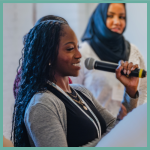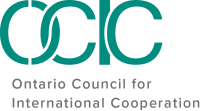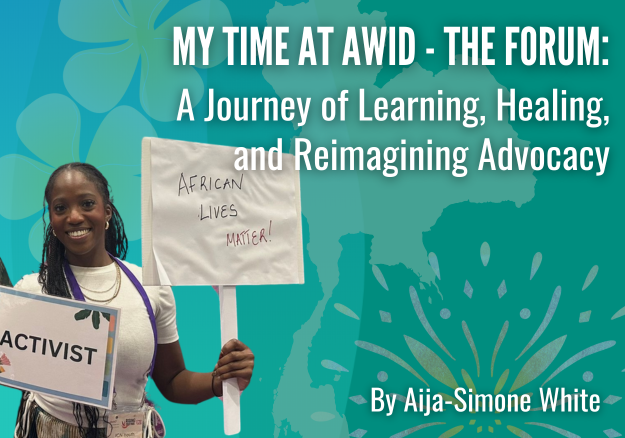My Time at Association for Women's Rights In
Development (AWID) - The Forum:
A Journey of
Learning, Healing, and Reimagining Advocacy
Aija-Simone White | January 20, 2025
Expectations vs. Reality
Heading into the 15th Association for Womens Rights In Development (AWID) Forum in Thailand, I wasn’t sure what to expect. Having attended professional conferences in the past, I worried it would follow the same formula: speakers on a stage, talking at you, recycling the same ideas we’ve all heard before, and little room for collaboration or innovation. As someone deeply invested in creating meaningful change, I feared this space might feel stagnant. But from the very moment I entered the AWID conference space, I was pleasantly surprised—and quickly realized this would be unlike anything I’d ever experienced. AWID wasn’t just a conference; it was a living, breathing manifestation of collective solidarity, learning, and advocacy.
Landing in Thailand
The moment I stepped off the plane in Bangkok, I sensed this trip would be transformative. Meeting my fellow youth delegates and council members for the first time in person felt electric—we embraced one another with warmth, excitement, and a shared determination to make the most of this experience. (Though I must admit, the worst jet lag of my life had me sleeping in three-hour bursts for the first 72 hours—fun times!) In between sessions, we explored Bangkok’s vibrant streets, visiting night markets, the reclining Buddha, and indulging in far too much mango sticky rice. Every moment—from sipping Thai tea to navigating bustling markets—felt alive with possibility and connection.
A Meeting with Delegate Ping
One of the standout moments of my time in Thailand was meeting Ambassador Ping Kitnikone and discussing Canada’s Indo-Pacific Strategy. Our conversation touched on cross-cultural exchanges, leveraging the Women, Peace, and Security agenda, and empowering women leaders in fields like healthcare and clean tech. What struck me most was how the framework emphasized generational approaches to peacebuilding and sustainability. This meeting reinforced the importance of sharing knowledge across borders, learning from one another, and building connections that transcend geographic and cultural divides. It was clear that this trip was going to be something truly special.
The Conference: A Space for Everyone
The AWID Forum was unlike any conference I’ve ever attended. The energy in the room was electric, amplified by the presence of powerful women and 2SLGBTQI+ individuals from every corner of the globe. What stood out most was the intentional inclusivity: translation services allowed participants to speak in their native languages, creating a truly affirming space where diverse voices could shine. I was especially moved by the centering of 2SLGBTQI+ and BIPOC communities throughout the conference—a testament to AWID’s commitment to intersectionality.
Beyond the numerous daily sessions, the conference featured booths from organizations doing vital feminist work globally. From decriminalizing drug use to advocating for sex workers’ rights, the breadth of issues showcased the beautifully complex mosaic of feminist movements. Feminism isn’t just one issue; it intersects with everything—economic justice, healthcare, 2SLGBTQI+ rights, and more. It was humbling and inspiring to see how each group tackled these issues in their own unique ways, demonstrating the power of decolonizing and reimagining feminism.
Days 1–4: Immersing in Feminist Advocacy and Healing
Day 1: Connect in Struggle and Solidarity
The first session I attended was titled Connect in Struggle and Solidarity, and it set the tone for the entire conference. Feminist leaders from Palestine, Myanmar, Sudan, and the Zapotec culture shared how women are leading resistance movements in the face of erasure and oppression. From Sudanese women finding strength in sisterhood amidst political failure to Zapotec feminists reframing crises as opportunities, the common thread was clear: solidarity requires courage and a willingness to go beyond comfort. My biggest takeaway? Feminism is a form of active resistance, and we must lift the ceiling on what we demand—not settle for the bare minimum.
Day 2: Pan-African and Feminist Philanthropies
On the second day, I attended Pan-African and Feminist Philanthropies: Building Alternative Narratives and Practices. This session emphasized how liberation movements must be resourced holistically—not just with money but with trust, love, and community. Feminist philanthropy challenges neoliberal models by prioritizing intangible resources like joy, collective care, and access to power. My key takeaway? We must fund our own liberation, channeling traditions of giving into survival and movement-building.
Day 3: How We Heal: A Feminist Approach to Art Therapy
On day three, I attended How We Heal: A Feminist Approach to Art Therapy for Women Living in Conflict. This session explored how creative expression—through music, dance, ceramics, and other art forms—connects women to their lived realities, promotes emotional well-being, and builds resilience. Art therapy isn’t just about healing; it’s about empowerment, offering women a safe space to process trauma and take control of their narratives. My biggest takeaway? Art can create alternative scenarios for survival, healing, and transformation.
Day 4: The Me Too Global Movement
The final day of the conference ended on a high note with The Me Too Global Movement: An Introduction to What We Can Do Together That We Can’t Do Separately, led by Tarana Burke herself. This session highlighted how the Me Too movement has leveraged global networks to amplify voices and address systemic sexual violence. Tarana emphasized the importance of co-creation, working collaboratively across borders without imposing solutions. My key lesson? Community problems require community solutions. Liberation work is about humanity, healing, and envisioning a future where safety and justice are non-negotiable.
My Biggest Takeaways
- The Power of Co-Creation: Effective movements aren’t about imposing solutions but about collaborating with communities to address their unique challenges. This has reshaped how I approach policy development for equity and justice—ensuring the voices of those most affected are at the center.
- Advocacy Beyond the Traditional: AWID reminded me that advocacy is multifaceted. Healing, storytelling, and art are just as impactful as legislative reforms. Policy-making must embrace these alternative tools to address the root causes of systemic issues.
- Centering Communities in Policy: Policies must be developed with communities, not imposed upon them. The forum reinforced the importance of intersectionality and community-led solutions, ensuring that policy reflects the lived realities of those it’s meant to serve.
Potential Opportunities for Growth
Given that the AWID Forum was centered on feminist and gender equality movements, it was inspiring to see so many gender-based organizations working at the intersections of other social justice movements. However, there’s an exciting opportunity to use this forum as a space to intentionally partner with movements addressing racial justice, economic equity, and Indigenous sovereignty to foster an even broader ecosystem of change. By building stronger bridges across these interconnected issues, we can amplify collective impact, ensuring that all movements thrive while staying true to their unique contexts. This kind of cross-movement collaboration could deepen solidarity and expand the possibilities for systemic transformation.
Final Thoughts
AWID wasn’t just a conference; it was a transformative experience that challenged me to rethink what advocacy and healing can look like. We cannot collectively heal using the same tools that the oppressor uses to harm us. Neoliberal solutions often fall short—they isolate rather than unite, manage symptoms rather than address root causes.
To create meaningful change, we must step outside traditional frameworks and reimagine what policy solutions can be. Liberation begins when we stop replicating systems of harm and start co-creating solutions rooted in community, solidarity, and healing. As advocates, we have the power—and responsibility—to build a future that reflects the beautiful possibilities we saw at AWID. Let’s keep imagining, co-creating, and healing—because that’s where the real work begins.
 Aija-Simone White
Aija-Simone White
OCIC Youth Policy-Makers Hub Member and Senior Policy Advisor with the Ontario Public Service
Aija (she/her) is deeply passionate about equity, health, and gender justice. Her love for policy drives her advocacy work, shaping how she champions systemic change for marginalized communities, particularly women of colour and 2SLGBTQI+ individuals. She holds a Bachelor of Health Studies from York University. As a Senior Policy Advisor at the Ministry of Child, Community, and Social Services, she has led policy changes to improve social assistance delivery, enhance long-term care programs, and strengthen primary healthcare connectivity for Ontario’s most vulnerable.







